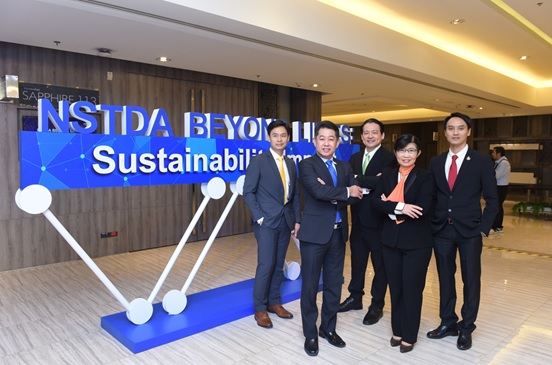On 20 December 2019, NSTDA held a press conference announcing its Research Highlights 2019 and Research Outlook 2020. Dr. Narong Sirilertworakul, NSTDA President, presented the following examples of projects and innovations that have made social and economic impact in 2019:
- LOMAR: Latex concentrate for mixing with asphalt cement for road construction. LOMAR can substitute commercial latex concentrate for road construction. In 2019, the material has been used in the construction of 1,850-km road, creating over 1.2 billion THB impact.
- Cassava Mosaic Disease Management. BIOTEC-NSTDA and partner organizations have developed solutions, including disease diagnosis, variety development, disease-free cutting production technology and biocontrol, to manage cassava mosaic disease, a detrimental disease that can potentially destroy 80% of cassava production in Thailand.
- Development of Elite Parental Lines for Vegetable Breeding. The technology is expected to boost seed export by 8.3 billion THB.
- DentiiScan 2.0: 3-D Dental and Maxillofacial Scanner. Sixty machines have been installed in public hospital, performing over 7,000 scans.
- Establishment of EV Battery Testing Laboratory. This laboratory, a collaboration between NSTDA and Mercedes-Benz Manufacturing (Thailand), is the 1st facility in Thailand and ASEAN to perform testing of battery for electric vehicle.
- Biodegradable Plastic Bag for Food Waste Collection. Co-developed by MTEC-NSTDA and Thai companies, this biodegradable plastic bag takes 3-4 months to fully decompose. The bags made a debut at the Red Cross Fair 2019.
- Study of Raptors’ Migration Route Using Solar-powered Satellite Tracking Devices. The study will help promote Khao Dinsor in Chumphon province as a premier site to observe migratory raptors and support eco-tourism.
- AI for Thai: Thai Artificial Intelligence Service Platform. Developed by NECTEC-NSTDA, the platform offers varieties of AI services such as language processing, machine translation, sentiment analysis, object recognition, speech to text, text to speech and chatbot. Such services have numerous applications in various industries, including logistics, healthcare and tourism. The platform has served 1,700 users since its launch.
For next year, NSTDA will continue to develop innovative solutions to support Bio-Circular-Green economic model (BCG), with the focus on four industries: agriculture and food; energy and materials; health and medicine; and tourism. In addition to technology development, NSTDA will also support human resource development, infrastructure development and employing international collaboration to advance research and develop new industries.

Dr. Somvong Tragoonrung, BIOTEC Executive Director, provided an insight into 2020 research plan that BIOTEC will develop technologies and products with the concepts of quality by design, functional features and environmental friendliness. Such technologies and products under development include biocontrol agents to replace chemical pesticides causing damages to human health and the environment; high-density aquaculture system to improve production efficiency and reduce antibiotic usage; biofinery process to convert agricultural by-products to high-value biochemicals; cannabis strain authentication tool to support a long-term cannabis collection establishment in the National Biobank of Thailand; and cannabis strain containing desired cannabidiol (CBD) content for medical use.
Dr. Chai Wutiwiwatchai, NECTEC Executive Director, revealed that NECTEC will continue to promote the use of AI to enhance the competitiveness of Thai industry and improve the quality of life for Thai people, through its Thai AI Service Platform. The endeavor will also support the campaign to drive Thailand to become an AI nation.
MTEC-NSTDA, under the leadership of Dr. Julathep Kajornchaiyakul, will employ its expertise to support BCG movement. Green & Safe Latex focus on novel production technologies of latex concentrate and novel products of latex concentrates, while reducing toxic chemical usage and minimizing proteins causing allergic reactions. The center will also develop its capacity in biodegradability testing, biomass & waste material conversion, high quality biodiesel production to support B10 and B20, food ingredients and Life Cycle Assessment (LCA) for supporting manufacturing and services industry, as well as tourism.
Dr. Wannee Chinsirikul, NANOTEC Executive Director, unveiled two major projects for 2020. The first one will be the use of nanotechnology to enhance the quality and function of dairy products, such as milk tablet and fortified milk. The second project will be the capacity development of nano robotics for medical applications such as drug delivery and surgery.
